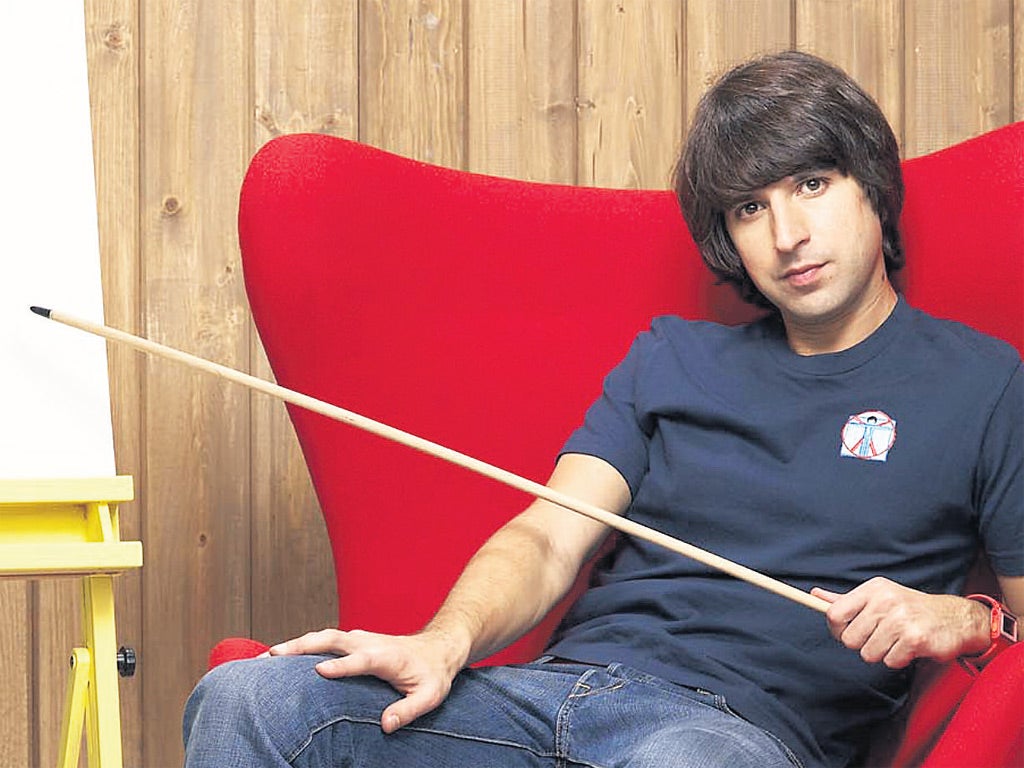Insight: Demetri Martin, Comedian
'I wrote a 500-word palindrome. It's really hard for them not to be gibberish'

Demetri Martin, 38, is a comedian, actor and writer. As well as winning 2003's Perrier comedy award, the New Jersey native has appeared on The Daily Show with Jon Stewart, Flight of the Conchords and his own show Important Things with Demetri Martin. A prolific palindrome writer and creator of funny diagrams, he also interned at the White House during the Clinton administration.
I want to learn how to tell stories more. I don't gravitate to it naturally but if you can develop that muscle it just seems that there's more that you can do when you want to connect with an audience. And it's easier to translate into different forms.
Doing the one-liners, I wouldn't say it's lazy, but it's more my natural state. Which is actually a convenient place to start in the States if you want to do television because you get only four or five minutes.
I started [doing comedy] in the summer of 1997. Before that, I had been in law school. Going through university and into law school, I didn't draw.
By the time I started doing comedy I hadn't drawn in years and I didn't play an instrument. But what happened was I had notebooks – I realised I really do need to write down my ideas because I wasn't remembering enough of them. But then I found myself drawing again like I was 13 years old. Just doodling.
It took maybe two years of doing stand-up before I tried bringing drawing on stage. It was just an experiment. It worked pretty well there in New York. So when I got a television special, I did it there and it worked well. When I toured and finally started to build a following in the States, I would just tell my jokes and then after the show people would come up say, "Where are the drawings? You're the guy with the drawings."
It was a year or two after that that I started to put in music. I tried to teach myself. So I could score things. It came in handy when I did the television show. I still get cheques – I get paid as a composer now. So it's kind of funny that I get a cheque for $100 as a royalty for the music I wrote for my series.
Sometimes there are some of the tough-guy comedians, as I like to call them, they fancy themselves as purists. They're like, "You play ukulele, man; a microphone is all I need." OK, great. I like to experiment. I can do two hours with just a microphone. No biggie. I'm 14 years in, I have jokes.
I'm not a hard-living guy. I'm not a Bill Hicks. My life doesn't go through that road. I feel like I'm more of an observer. I'm quiet. But I can dig; I can find that stuff.
Near the end of university I remember thinking, "I want to try stand-up some day so I don't regret it."
The truth is I thought I had to do something else besides law. That's why I did the White House internship. I thought I'd do policy, something like that. That was because I was president of my class every year from fifth grade, from age 10. I never lost an election. I realised then, around that time, when I was going through my crisis of what am I going to do with my life. I don't care about policy, I'm not a government guy. I like speaking in front of people. That's why I won the elections – because I gave speeches. I liked the performance of it.
I worked in the Domestic Policy Council with a deputy adviser to Bill Clinton. It taught me that I didn't want to work in politics. There was one guy, this one intern, who had just got the Rhodes Scholarship. He was the Truman Fellow or some fancy thing. And he also worked on a nuclear submarine in some capacity. So you could see, this guy wants to be President some day. Or he's going to be a senator. You'd see people and they were like walking resumés. It was very unappealing to me.
I play a scientist in Contagion. I have a small part. I want to do more acting. The dream is more the Woody Allen or Albert Brooks approach to film-making, where I would think of stories I want to tell and because I want to act, I'd write the parts for myself.
I have a 500-word palindrome. Which I know is not the world's longest. Georges Perec also wrote a 500-word palindrome in the 1970s, I believe. It's in French, of course. In 2002, these guys using a computer wrote a 2002-word-long palindrome. I read some of it and I was unimpressed.
Palindromes are an interesting game because what you have there is a very simple rule that yields complexity. You can tell the rule to a child. But it's hard to write them. And it's really hard for them not to be gibberish.
I feel more comfortable when I'm disengaged from pop culture. I like the fantasy of writing material that could have worked 15 years ago and maybe could work 15 years from now. I like the idea of doing material which requires no special knowledge other than being a person who is just alive in the world.
'This Is a Book' by Demetri Martin (Particular, £16.99) is out now
Subscribe to Independent Premium to bookmark this article
Want to bookmark your favourite articles and stories to read or reference later? Start your Independent Premium subscription today.

Join our commenting forum
Join thought-provoking conversations, follow other Independent readers and see their replies